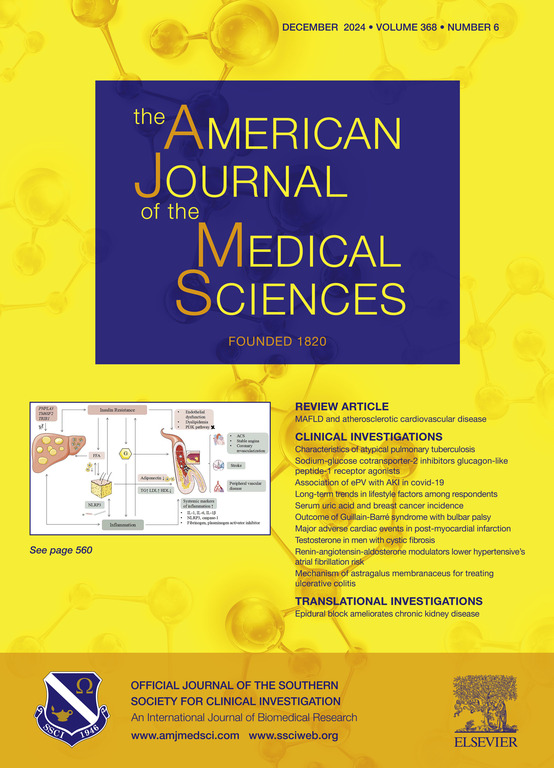Meta-analysis of renin angiotensin aldosterone modulators mitigating atrial fibrillation risk in hypertensive patients
IF 1.8
4区 医学
Q2 MEDICINE, GENERAL & INTERNAL
引用次数: 0
Abstract
Introduction
Hypertension is associated with left ventricular hypertrophy/enlargement/fibrosis and atrial ectopic rhythm, leading to an increased risk of Atrial Fibrillation (AF). We aimed to stratify the effect of Angiotensin Converting Enzyme Inhibitors (ACEi) and Angiotensin Receptor Blockers (ARB) on the risk of AF.
Methods
PubMed, Scopus, and Google Scholar databases were screened, and cross-citation was conducted for studies reporting AF in hypertensive patients on ACEi and ARB. Of 145 studies found till May 2023, 19 were included in this study. Binary random-effects models estimated the pooled odds ratios, I2 statistics assessed heterogeneity and sensitivity analysis was assessed using the leave-one-out method.
Results
153,559 hypertensive patients met the inclusion criteria. For incidental AF, ACEi and ARB showed a significant decrease in both unadjusted (OR 0.75, 95% CI [0.66-0.85], I² = 20.79%, p=0.29) and adjusted risks (OR 0.76, 95% CI [0.62–0.93], I² = 88.41%, p<0.01). In recurrent AF, the unadjusted analysis showed no significant effect (OR 0.89, 95% CI [0.55–1.42], I² = 78.44%, p<0.01), while the adjusted analysis indicated a reduced risk (OR 0.62, 95% CI [0.50–0.76], I² = 65.71%, p<0.01). Leave-one-out sensitivity analysis confirmed these results.
Conclusions
ACEi and ARB considerably decrease the risk of incidental and recurrent AF in hypertensive patients, emphasizing the importance of treating clinical hypertension with these drugs.
肾素血管紧张素醛固酮调节剂降低高血压患者心房颤动风险的 Meta 分析。
简介:高血压与左心室肥厚/增大/纤维化和心房异位节律有关,导致心房颤动(房颤)风险增加。我们旨在对血管紧张素转换酶抑制剂(ACEi)和血管紧张素受体阻滞剂(ARB)对房颤风险的影响进行分层:筛选了 PubMed、Scopus 和 Google Scholar 数据库,并交叉引用了报告服用 ACEi 和 ARB 的高血压患者房颤的研究。在截至 2023 年 5 月找到的 145 项研究中,有 19 项被纳入本研究。二元随机效应模型估算了汇总的几率比,I2统计量评估了异质性,并采用 "leave-one-out "方法评估了敏感性分析:153559名高血压患者符合纳入标准。对于偶发性房颤,ACEi 和 ARB 可显著降低未调整风险(OR 0.75,95% CI [0.66-0.85],I²=20.79%,p=0.29)和调整风险(OR 0.76,95% CI [0.62-0.93],I²=88.41%,p):ACEi 和 ARB 可显著降低高血压患者发生和复发房颤的风险,强调了使用这些药物治疗临床高血压的重要性。
本文章由计算机程序翻译,如有差异,请以英文原文为准。
求助全文
约1分钟内获得全文
求助全文
来源期刊
CiteScore
4.40
自引率
0.00%
发文量
303
审稿时长
1.5 months
期刊介绍:
The American Journal of The Medical Sciences (AJMS), founded in 1820, is the 2nd oldest medical journal in the United States. The AJMS is the official journal of the Southern Society for Clinical Investigation (SSCI). The SSCI is dedicated to the advancement of medical research and the exchange of knowledge, information and ideas. Its members are committed to mentoring future generations of medical investigators and promoting careers in academic medicine. The AJMS publishes, on a monthly basis, peer-reviewed articles in the field of internal medicine and its subspecialties, which include:
Original clinical and basic science investigations
Review articles
Online Images in the Medical Sciences
Special Features Include:
Patient-Centered Focused Reviews
History of Medicine
The Science of Medical Education.

 求助内容:
求助内容: 应助结果提醒方式:
应助结果提醒方式:


